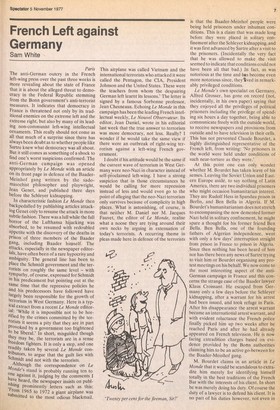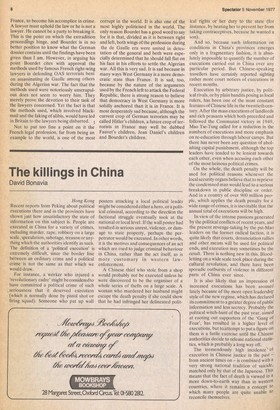French Left against Germany
Sam White
Paris The anti-German outcry in the French left-wing press over the past three weeks is more revealing about the state of France that it is about the alleged threat to democracy in the Federal Republic stemming from the Bonn government's anti-terrorist measures. It indicates that democracy in France is threatened not only by its traditional enemies on the extreme left and the extreme right, but also by many of its leading non-communist left-wing intellectual ornaments. This really should not come as all that much of a surprise since there has always been doubt as to whether people like Sartre knew what democracy was all about. But it still comes as something of a shock to find one's worst suspicions confirmed. The anti-German campaign was opened appropriately by Le Monde with an article on its front page in defence of the BaaderMeinhof gang written by the sadomasochist philosopher and playwright, Jean Genet, and published three days before the Schleyer kidnapping.
In characteristic fashion Le Monde then backpedalled by publishing articles attacking Genet only to resume the attack in more subtle fashion. There was a lull while the full horror of the Lufthansa hijacking was absorbed, to be resumed with redoubled appetite with the discovery of the deaths in prison of three members of the Baader gang, including Baader himself. The attacks, especially in the newspaper editorials, have often been of a rare hypocrisy and ambiguity. The general line has been to Place the Schmidt government and the terrorists on roughly the same level — with !Yrripathy, of course, expressed for Schmidt in his predicament but pointing out at the same time that the repressive policies he and his predecessors have followed have largely been responsible for the growth of terrorism in West Germany. Here is a typical extract from a recent Le Monde editorial: 'While it is impossible not to be horrified by the crimes committed by the terrorists it seems a pity that they are in part Provoked by a government too frightened to be liberal.' In short, misguided though they may be, the terrorists are in a sense freedom fighters. It is only a step, and one readily taken by several Le Monde contributors, to argue that the guilt lies with Schmidt and not with the terrorists.
Although the correspondence on Le Monde's stand is probably running ten to one against it, judging by the comments I hav.e heard, the newspaper insists on publ!shing prominently letters such as this: From 1965 to 1972 a giant airplane was submitted to the most odious blackmail. This airplane was called Vietnam and the international terrorists who attacked it were called the Pentagon, the CIA, President Johnson and the United States. These were the teachers from whom the despairing German left learnt its lessons.' The letter is signed by a famous Sorbonne professor, Jean Chesneaux. Echoing Le Monde in this campaign has been the leading French intellectual weekly, Le Nouvel Observateur. Its editor, Jean Daniel, wrote in his editorial last week that the true answer to terrorism was more democracy, not less. Really? I wonder if he would take the same view if there were an outbreak of right-wing terrorism against a left-wing French government.
I doubt if his attitude would be the same if the current wave of terrorism in West Germany were neo-Nazi in character instead of self-proclaimed left-wing. I have a strong suspicion that in those circumstances he would be calling for more repression instead of less and would even go to the point of alleging that the neo-Nazi terrorism only survives because of complicity in high places. What is astonishing, of course, is that neither M. Daniel nor M. Jacques Fauvet, the editor of Le Monde, realise what a noose they are tying around their own necks by arguing in extenuation of today's terrorists. A recurring theme in pleas made here in defence of the terrorists is that the Baader-Meinhof people were being held prisoners under inhuman conditions. This is a claim that Was made long before they were placed in solitary con finement after the Schleyer kidnapping, and it was first advanced by Sartre after a visit to the prisoners. (Incidentally the very fact that he was allowed to make the visit seemed to indicate that conditions could not have been all that bad.) In fact, as was notorious at the time and lies become even more notorious since, they Ived in remarkably privileged conditions.
Le Monde's own specialist on Germany, Alfred Grosser, has gone on record (not, incidentally, in his own paper) saying that they enjoyed all the privileges of political prisoners including the privilege of spend ing six hours a day together, being able to communicate freely with the outside world, to receive newspapers and provisions from outside and to have television in their cells.
This has not prevented Claude Bourdet, a highly distinguished representative of the French left, from writing: 'No prisoners in the world were held under conditions of such near-torture as they were.'
At this point one can only wonder whether M. Bourdet has taken leave of his senses. Leaving the Soviet Union and East ern Europe aside, to say nothing of Latin America, there are two individual prisoners who might occasion humanitarian interest.
They are Rudolf Hess in Spandau prison in Berlin, and Ben Bella in Algeria. If M.
Bourdet's humanitarianism does not stretch to encompassing the now demented former Nazi held in solitary confinement, he might spare a thought for his former friend Ben Bella. Ben Bella, one of the founding fathers of Algerian independence, went with only a few days' interruption straight from prison in France to prison in Algeria. Since then nothing has been heard of him nor has there been any news of Sartre trying to visit him or Bourdet organising any protest meetings on his behalf. We now come to the most interesting aspect of the anti German campaign in France and this concerns the strange case of the Baader lawyer Klaus Croissant. He escaped from Ger many only a few days before the Schleyer kidnapping, after a warrant for his arrest had been issued, and took refuge in Paris.
After his disappearance the arrest warrant became an international arrest warrant, and with evident reluctance the French police finally picked him up two weeks after he reached Paris and after he had already appeared on French television.He is now facing extradition charges based on evidence provided by the Bonn authorities claiming him to be an active go-between for the Baader-Meinhof gang.
M. Bourdet claims in an article in Le Monde that it would be scandalous to extra dite him merely for identifying himself totally in the best traditions of the French Bar with the interests of his client. In short he was merely doing his duty. Of course the duty of a lawyer is to defend his client. It is no part of his duties however, not even in France, to become his accomplice in crime. A lawyer must uphold the law or he is not a lawyer. He cannot be a party to breaking it. This is the point on which the extradition proceedings hinge, and Bourdet is in no better position to know what the German dossier contains until the findings have been given than I am. However, in arguing his point Bourdet cites with approval the methods used by famous French right-wing lawyers in defending OAS terrorists bent on assassinating de Gaulle among others during the Algerian war. The fact that the methods used were notoriously unscrupulous does not seem to worry him. They merely prove the devotion to their task of the lawyers concerned. Yet the fact is that the methods used, which involved blackmail and the faking of alibis, would have led in Britain to the lawyers being disbarred. t Not to put too fine a point on it the French legal profession, far from being an example to the world, is one of the most corrupt in the world. It is also one of the most highly politicised in the world. The only reason Bourdet has a good word to say for it is that, divided as it is between right and left, both wings of the profession during the de Gaulle era were united in detestation of the general and both were especially determined that he should fall flat on his face in his efforts to settle the Algerian war. All this is very sad. It is sad because in many ways West Germany is a more democratic state than France. It is sad, too, because by the nature of the arguments used by the French left to attack the Federal Republic, there is strong reason to believe that democracy in West Germany is more solidly anchored than it is in France. It is most desperately sad because, although the current crop of German terrorists may be called Hitler's children, a future crop of terrorists in France may well be dubbed Fauvet's children, Jean Daniel's children and Bourdet's children.



































 Previous page
Previous page